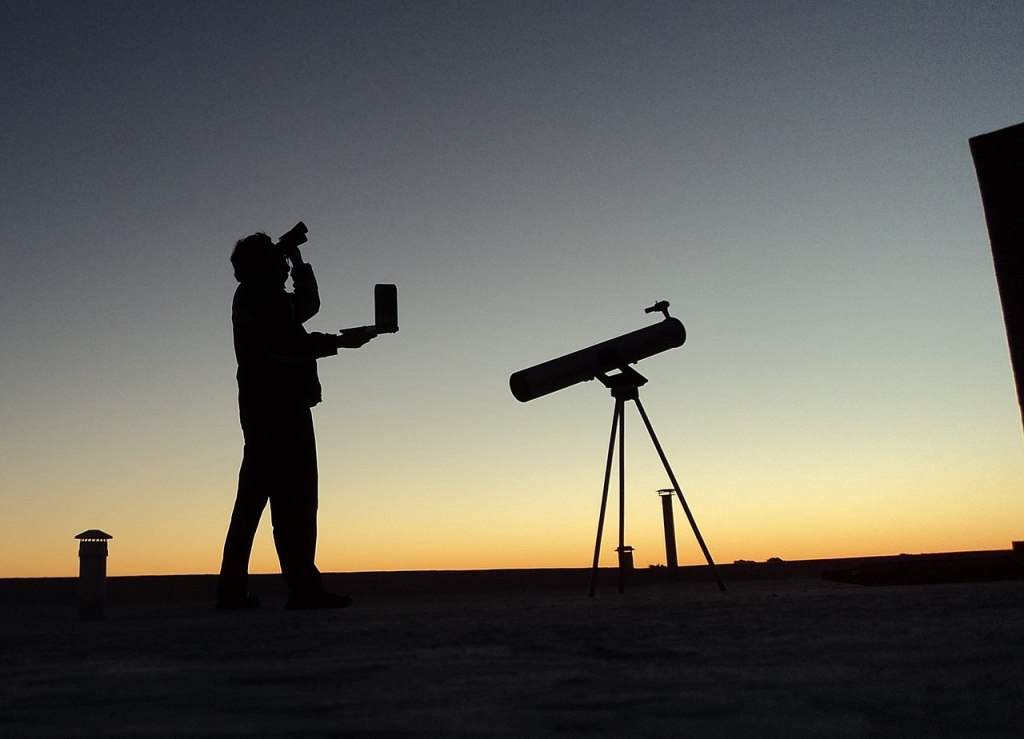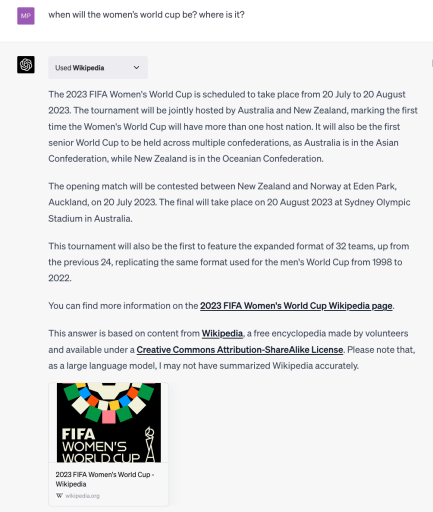The mission of the Wikimedia movement has always been to bring free knowledge to everyone in the world. We are striving to be the essential infrastructure of the ecosystem of free knowledge. However, we know that recent technological developments – advances in artificial intelligence, new social apps, and devices that allow us to interact with the digital world in new ways – are moving quickly and may have a big impact on how knowledge is created and accessed. While our mission remains the same as when Wikipedia started over 20 years ago, the methods to accomplish it will need to continue to evolve.
This post explains how the Wikimedia Foundation is approaching experimentation and learning about the future, and describes an experiment unfolding right now: the creation of a plug-in for ChatGPT.
How can Wikimedia’s product and platform evolve to meet the needs of new audiences?
The Wikimedia movement recognized the need for evolution in Movement Strategy Recommendation #9: “Innovate in Free Knowledge”, which calls for “change, flexibility, and experimentation to stay relevant” as technology evolves. With rapid changes in technology, this recommendation may be more timely and relevant than ever before. That said, there are many different strategies we could pursue as a movement to continue to meet our goals of sharing free knowledge as both technology and user behavior changes, and we must be thoughtful about prioritizing the opportunities and ideas we choose to pursue. For example: Should we invest in the capacity to create and curate rich media content to bring more people to our sites and apps? Should we strive to make it easier for our existing content to be reused in any online experience where people like to spend time, including AI assistants and social apps? Something else?
Each of these directions will require a great deal of thought, investment, and buy-in from the movement, but we don’t yet know which direction will be more promising for sustaining our content and communities in the decades to come. To address this uncertainty, as part of this year’s Annual Plan, the Wikimedia Foundation is creating a new track of work called “Future Audiences.” Future Audiences is a cross-team collaboration – involving Product & Technology, Partnerships, Machine Learning, Research, Communications, and other teams at the Foundation, as well as members of the Wikimedia community from around the world – to explore strategies for expanding beyond our existing audiences of readers, reusers, and contributors, in an effort to truly reach everyone in the world as the “essential infrastructure of the ecosystem of free knowledge”.
Future Audiences has two objectives:
- Continue to sharpen our view of what the future will look like. We started our planning for this fiscal year by looking at the major external trends in technology and user behavior that may impact the sustainability of the Wikimedia movement. Future Audiences will describe several possible “future states” that are different from today’s status quo (in which we rely on search engines to drive readers and new contributors to our projects) – for example, a possible “future state” where knowledge is primarily shared and consumed off of our platforms, via AI assistants or social apps, or a possible “future state” where we can encourage more knowledge-seekers to come directly to our web domains and apps through new products and experiences. You can read more about our early thinking on these future states on our Meta-Wiki page, and we hope that interested Wikimedians can help us shape them further.
- Run ongoing experiments to learn how we can engage audiences in that future. We will test hypotheses in two areas where we have seen major recent shifts in both the user behavior and the technology enabling knowledge search: 1) conversational/generative AI, which is being used to power new question-and-answer experiences by established and new technology platforms, and 2) third-party social apps, which are increasingly becoming entry points to search, especially among younger audiences.
Through these two objectives, we plan to continuously develop learnings that we will share and use to guide our future planning.
First hypothesis: can we engage audiences through AI assistants?
Our first experiment aims to understand how Wikimedia can become the essential infrastructure of free knowledge in a possible future state where AI transforms knowledge search. (To read about the Wikimedia Foundation’s broader understanding of the generative AI space, please see this blog by the Foundation’s Chief Product and Technology Officer, Selena Deckelmann, the first piece in a new series on this topic on Medium.)
ChatGPT Plugins allow third parties to create custom functionality within ChatGPT. We have developed an experimental Wikipedia plugin that allows ChatGPT to search for and summarize the most up-to-date information on Wikipedia in answer to general knowledge queries. Importantly, the plugin also allows us to specify the attribution that should be included for this content and provide links to Wikipedia articles for further reading.
Plugins are currently an experimental beta feature in ChatGPT, which gives us an opportunity to test our key assumptions quickly and nimbly, without devoting a large amount of resources to building out and maintaining a polished product. From this experiment, we hope to:
- Learn whether users of AI assistants like ChatGPT are interested in getting summaries of verifiable knowledge from Wikipedia — as opposed to unattributed knowledge generated from unspecified training data. We hope that by providing verifiable citations to Wikipedia, our plugin will create a better, more reliable learning experience for ChatGPT users.
- Learn whether some of these users would be interested in making meaningful contributions that sustain our projects, whether it’s learning more about how our volunteer communities work, getting involved in editing, and/or donating to support the movement.
- Understand what the quality of the output is when an AI interacts with Wikipedia content. This will allow us to get a better sense of whether we will need to make any changes or improvements to our infrastructure – not just for ChatGPT plugin users, but potentially for users on our projects if we decide to pursue any AI-enhanced products and experiences on our platform in the future.
- Begin to shape how Wikimedia content gets used by generative AI, and use our learning to advocate for better attribution and source transparency on all external AI assistants.
You can read more about the ChatGPT plugin experiment (and how you can get involved in testing) on our Meta-Wiki page.
Other hypotheses: can we engage audiences on social apps?
In addition to exploring opportunities within the realm of AI, Future Audiences also intends to better understand how knowledge is spread on rich media social apps like Instagram, TikTok, and YouTube, and whether and how we can leverage these platforms and the creators on them to raise awareness and contribute to the sustainability of the free knowledge movement.
We will update the Meta-Wiki page with more information about this experimental track as it develops.
How will we operationalize what we learn?
As we identify promising future states and innovative strategies for sharing and sustaining knowledge, learnings from Future Audiences will influence and be expanded through our Product and Technology work (defined in the Foundation’s Annual Plan under Wiki Experiences, and Signals and Data Services) and other areas of work, nudging our product and technology offerings toward where they need to be to serve knowledge-seekers and knowledge-sharers of the future. Our objectives for Future Audiences should drive us to experiment and explore as we bring a vision for the future of free knowledge into focus.
How do I get involved?
There are a range of ways to get involved in this area of work, and we welcome your participation. Being involved may mean any of these things:
- Joining periodic meetings to talk through experiment ideas and results from your perspective.
- Spreading the word about this work to your community and language.
- Helping test prototypes of new software.
- Helping label data for the creation of machine learning models.
We invite anyone in the Wikimedia community who wants to stay engaged and help us test and learn to sign up and indicate your areas of interest on our project page on Meta-Wiki.
Maryana Pinchuk is a principal product manager in the Product and Technology Department at the Wikimedia Foundation.

Can you help us translate this article?
In order for this article to reach as many people as possible we would like your help. Can you translate this article to get the message out?
Start translation

